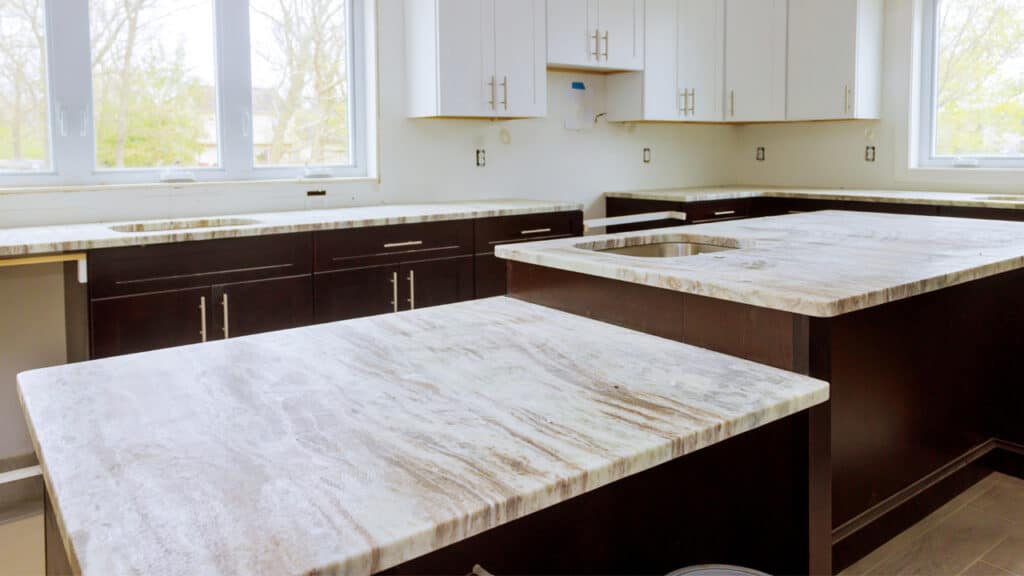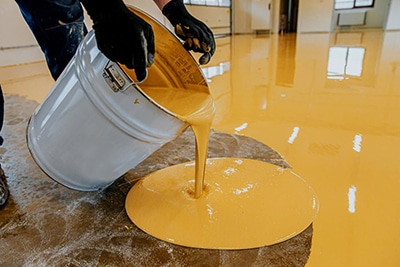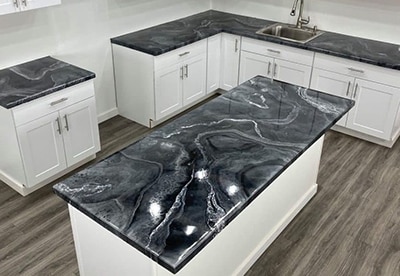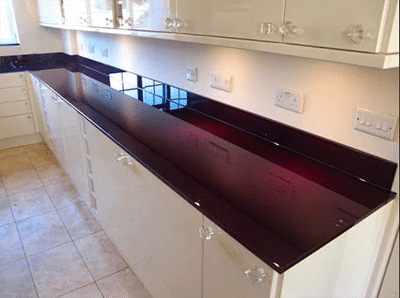DJ Corporate Solutions: Epoxy Flooring, Epoxy Countertops, and Interior & Exterior Painting Services
Epoxy countertops are an excellent choice for kitchens, bathrooms, and other high-traffic areas. Not only do they offer a sleek and modern aesthetic appearance, but they are also incredibly durable and resistant to scratches, stains, and heat. However, like any surface in your home, epoxy countertops and other epoxy resin surfaces require regular cleaning to maintain their beauty and functionality. In this guide, we will discuss the proper way to clean and maintain an epoxy resin surface, so they continue to look stunning for years to come.
What is Epoxy Resin?
Epoxy resin, often simply referred to as ‘epoxy’, is a versatile material frequently used in countertop construction due to its durability, non-porous characteristics, and remarkable sheen that adds aesthetic appeal. Composed of a combination of epoxide resin and polyamine hardener, when mixed together, these two components react to form a hard, solid plastic material that’s highly resistant to wear and tear.
However, while epoxy countertops are known for their resilience and longevity, they do require special care during cleaning to maintain their glossy finish. Inappropriate cleaning agents or harsh materials can scratch the surface, dull the shine, or even damage the epoxy resin. Hence, understanding the right cleaning methods for epoxy countertops is crucial to preserving their look and durability.
Materials You Will Need
Before we dive into the surface cleaning process, let’s first gather all the necessary materials:
- Mild soap or all-purpose cleaner
- Warm water
- Soft cloth or sponge
- Non-abrasive scrub brush
How Do I Care For My Epoxy Resin Countertops?
Cleaning epoxy countertops is a straightforward process that can be done with some basic household items. Here are some essential tips and care instructions to keep in mind while cleaning your epoxy countertops:
Monthly Cleaning
It is vital to maintain a consistent cleaning schedule for your epoxy surfaces, ideally on a weekly or monthly basis. Regular cleaning not only keeps the countertop looking new but also extends its lifespan.
Non-Abrasive Household Cleaners
Stay away from harsh or abrasive cleaning agents as they can scratch or dull the resin’s surface. Always opt for non-abrasive household cleaners for the best results.
Use a Damp Cloth
For regular cleaning, simply use a damp cloth and some mild dish soap. This method is often sufficient to keep your epoxy resin countertops looking their best.
Soap and Water
In case of spills or stains, a combination of basic soap and water can be quite effective. Apply the soapy solution to the stain, leave it for a few minutes, and then gently wipe it off.
Proper Care
Taking proper care of your countertops involves promptly removing residues or spills. Since epoxy is non-porous, substances won’t seep into the material but can still cause discoloration if not promptly removed.
Maintain with Mineral Oil
To maintain the glossy sheen of your epoxy countertops, lightly coat the surface with mineral oil like Murphy’s Oil conservatively every few months. This will not only enhance its appearance but also protect it from scratches.
Use a Paper Towel
A paper towel can be an efficient tool for cleaning epoxy countertops, especially if it is highly absorbent. It is perfect for quickly mopping up spills or for removing residues.
Air Dry
After cleaning, it is best to allow your countertop to air dry. This helps to prevent streaks and maintains the glossy finish of the epoxy resin.
Circular Motion
When wiping your countertop, always move the cloth in a circular motion. This method helps to avoid streaks and leads to a more thorough cleaning.
By following these tips and dedicating some time to regularly cleaning and caring for your epoxy countertops, you can ensure that they remain in prime condition and continue to add aesthetic appeal to your home.
What Should I Never Use On My Epoxy Resin Countertops or Other Epoxy Resin Surfaces?
Avoid the following harmful cleaning agents when maintaining your epoxy countertops:
Acetone
Never apply acetone directly to your epoxy countertop. While acetone can be useful for removing stubborn stains on other surfaces, it can actually damage epoxy resin.
Stronger Cleaning Agents
Cleaners that contain strong chemicals can deteriorate the surface area of your countertop, including diluted bleach and diluted alcohol. While these may be effective for chemical stains elsewhere, they are not suitable for epoxy surfaces.
Soft Scrub
Although the name implies that it’s gentle, Soft Scrub is too abrasive for epoxy countertops and can leave scratches.
Abrasive Pads and Scouring Pads
These pads can scratch and dull the glossy finish of your countertop.
Paint Thinner
This can cause chemical spills that may damage the epoxy resin.
Liquid Nitrogen and Dry Ice
These substances are too extreme for cleaning purposes and can severely damage your epoxy countertop.
Chemical Spills
Be cautious of accidentally spilling chemicals, as these can cause stains that are difficult to remove.
Ordinary Soap
This may seem harmless, but some soaps can leave a residue that dulls the shine of your epoxy countertop.
Glass Cleaner
While great for windows, glass cleaner can leave streaks on your countertop, compromising its sheen.
Polish Containing Wax
Avoid using any polish that contains wax, as it can leave a hazy film on your epoxy surface.
While these substances can effectively clean other materials, they can cause harm to your epoxy resin countertops. Regularly using a damp cloth and mild dish soap is the best way to maintain the glossy finish of your countertop and prevent staining. In case of tougher stains, a non-abrasive cleaner specifically designed for epoxy surfaces is recommended. Remember, caring for your epoxy countertop appropriately will ensure its longevity and sustained aesthetic appeal.
Frequently Asked Questions
Can I use a hard surface cleaner on my epoxy countertop?
While some hard surface cleaners might be safe on epoxy, it’s essential to make sure they are non-abrasive and do not contain harsh chemicals that can damage the epoxy resin. Always read the product label before use.
How should I clean my lab epoxy surfaces?
Maintaining a clean lab environment is crucial. With epoxy surfaces, using a damp cloth and mild dish soap for regular cleaning is usually sufficient. For tougher stains, use a non-abrasive cleaner specifically designed for epoxy surfaces. Always remember to clean up spills promptly to keep your lab in an uncontaminated working environment.
How do various chemicals affect epoxy countertops?
Epoxy is non-porous and generally resistant to most chemicals. However, spills should be cleaned up promptly to prevent discoloration. Certain chemicals, such as acetone, strong cleaning agents, and paint thinner, can damage the epoxy and should be avoided.
Can I use finish oil on my epoxy countertop?
Yes, lightly coating your epoxy countertop with a finish oil, such as mineral oil, every few months can help maintain its glossy sheen and protect it from scratches. However, be sure not to overapply, as this can make the surface sticky.
How can I ensure an uncontaminated working environment with epoxy surfaces?
Promptly cleaning up spills or residues will help maintain an uncontaminated work environment. Using a non-abrasive cleaner specifically made for epoxy surfaces can help maintain its cleanliness without damaging the surface.
How can I maintain the finish of my epoxy work surface?
To maintain the finish of your epoxy work surface, clean it regularly with a damp cloth and mild dish soap. In case of spills or stains, a non-abrasive cleaner can be used. To maintain the glossy sheen, lightly coat the surface with mineral oil every few months.




